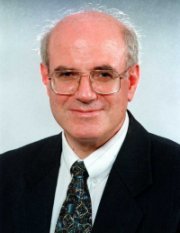• (For the full Curriculum Vitae click here)

Israel Hanukoglu was born in Istanbul, Turkey in 1952 and lived there until 1969. In 1969, he received an AFS International Scholarship for his senior year at Craig High School in Janesville, Wisconsin, USA. After graduating from Craig HS, he came to Israel in 1970 and studied at the Hebrew University of Jerusalem. In 1974, he finished his studies at the Hebrew U., graduating cum laude with two majors in biology and psychology and a minor in political science.
In 1975, he went to the University of Wisconsin-Madison for graduate studies (M.Sc., 1976; Ph.D., 1980). In his doctoral work on the mechanism of electron transport in mitochondrial P450 systems, he isolated the enzymes that convert cholesterol into steroid hormones and elucidated essential steps in steroid hormone biosynthesis. In later postdoctoral studies at the Department of Biochemistry of the University of Chicago, he determined the first sequences and structures of intermediate filament type keratins that form skeletal structures within the cell.
After returning to Israel, he concentrated on cloning the genes of some mitochondrial enzymes that are involved in steroid hormone synthesis. He cloned the first gene for the reductase of all mitochondrial P450 systems. Using this enzyme as a model he discovered a common structure for NADP coenzyme binding sites which led to the definition of a new structural class of metabolic enzymes with hundreds of seemingly unrelated members. These studies were capped by the elucidation of the 3D atomic structure of adrenodoxin reductase (in collaboration with Prof. G. Schulz) which revealed a new enzyme structure. The sequence motifs he discovered enabled the engineering of new metabolic enzymes with different coenzyme dependencies.
In 1991, his endocrinologist brother Prof. Aaron Hanukoglu (Tel Aviv University Medical School), reported that a hereditary syndrome of unresponsiveness to steroid hormone aldosterone includes two different forms. After this finding, the two brothers started working together to understand the genetics of these syndromes called pseudohypoaldosteronism type 1 (PHA). In 1994, they reported that the severe form of PHA results from mutations in the three genes that code for the three subunits of epithelial sodium channels (ENaC) (see list of publications). These studies also helped establish that ENaC is the principal channel involved in blood volume and blood pressure regulation in humans.
In 1995, he moved his lab from the Weizmann Institute to the College of Judea and Samaria which later developed into Ariel University. In 2003 he established an undergraduate degree program in molecular biology. This was the first B.Sc. (Bachelor of Science) degree program in molecular biology accredited by the Council for Higher Education in Israel. After founding the Department of Molecular Biology he served as the Department Chairman for five years (2003-2008).
In summary, in his scientific work, Prof. Hanukoglu cloned about ten novel genes and discovered novel protein sequence motifs. He played a key role in establishing the subdiscipline of molecular steroidogenesis by organizing the first symposium in this field. The list of academic awards he received for his research include the US National Research Service Fellowship in Biochemistry in 1982, the Henri Gutwirth Award for Excellence in Research in Technion in 1984, Delta Research Career Development Award at the Weizmann Institute, The first Hans Lindner Prize awarded by the Israel Endocrine Society in 1988, and the Lubell Prize for outstanding research at the Weizmann Institute of Science. His research has been supported by national and international agencies among them, The Israeli Academy of Sciences, Ministry of Science, Ministry of Health, and the US National Institutes of Health.
National and Civic Roles
Besides a scientific career, Prof. Hanukoglu has maintained an active academic and civic leadership role. In 1995 he was elected as the Chairman of the Professors for a Strong Israel, the largest non-partisan organization of professors in Israel. From 1996 to 1999 he served as the Science Adviser to Prime Minister Benjamin Netanyahu. In 2003 he was appointed as the scientific adviser to the Mayor of Rishon-Lezion for establishing the Jewish Nobel Laureates Boulevard. Since 1996 he has served as a founding member of the Ariel Center for Policy Research executive board. During his work at the Weizmann Institute of Science, he was elected for five consecutive years as the representative of senior scientists in the Scientific Council. During his undergraduate studies, he served for three years as the class representative of the Psychology majors.
After his tenure as the Science Adviser to the Prime Minister, Prof. Hanukoglu established Israel Science and Technology Homepage, ( www.science.co.il ) which has evolved into a science and technology portal for Israel.
